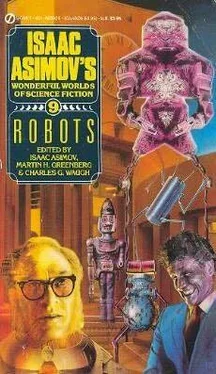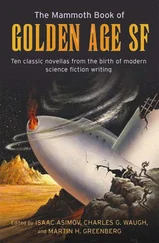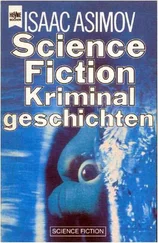Frederik Pohl - Isaac Asimov's Worlds of Science Fiction. Book 9 - Robots
Здесь есть возможность читать онлайн «Frederik Pohl - Isaac Asimov's Worlds of Science Fiction. Book 9 - Robots» весь текст электронной книги совершенно бесплатно (целиком полную версию без сокращений). В некоторых случаях можно слушать аудио, скачать через торрент в формате fb2 и присутствует краткое содержание. Год выпуска: 1989, ISBN: 1989, Издательство: Robinson Publishing, Жанр: Фантастика и фэнтези, на английском языке. Описание произведения, (предисловие) а так же отзывы посетителей доступны на портале библиотеки ЛибКат.
- Название:Isaac Asimov's Worlds of Science Fiction. Book 9: Robots
- Автор:
- Издательство:Robinson Publishing
- Жанр:
- Год:1989
- ISBN:ISBN: 1-85487-041-6
- Рейтинг книги:4 / 5. Голосов: 1
-
Избранное:Добавить в избранное
- Отзывы:
-
Ваша оценка:
- 80
- 1
- 2
- 3
- 4
- 5
Isaac Asimov's Worlds of Science Fiction. Book 9: Robots: краткое содержание, описание и аннотация
Предлагаем к чтению аннотацию, описание, краткое содержание или предисловие (зависит от того, что написал сам автор книги «Isaac Asimov's Worlds of Science Fiction. Book 9: Robots»). Если вы не нашли необходимую информацию о книге — напишите в комментариях, мы постараемся отыскать её.
Isaac Asimov's Worlds of Science Fiction. Book 9: Robots — читать онлайн бесплатно полную книгу (весь текст) целиком
Ниже представлен текст книги, разбитый по страницам. Система сохранения места последней прочитанной страницы, позволяет с удобством читать онлайн бесплатно книгу «Isaac Asimov's Worlds of Science Fiction. Book 9: Robots», без необходимости каждый раз заново искать на чём Вы остановились. Поставьте закладку, и сможете в любой момент перейти на страницу, на которой закончили чтение.
Интервал:
Закладка:
"Guy?" His wife was calling him querulously from the foot of the stairs. "Guy, dear, are you all right?"
He called weakly, "Sure."
There was a pause. Then Mary said doubtfully, "Breakfast is ready. Are you sure you're all right? I thought I heard you yelling."
Burckhardt said more confidently, "I had a bad dream, honey. Be right down."
In the shower, punching the lukewarm-and-cologne he favored, he told himself that it had been a beaut of a dream. Still bad dreams weren't unusual, especially bad dreams about explosions. In the past thirty years of H-bomb jitters, who had not dreamed of explosions?
Even Mary had dreamed of them, it turned out, for he started to tell her about the dream, but she cut him off. "You did?" Her voice was astonished. "Why, dear, I dreamed the same thing! Well, almost the same thing. I didn't actually hear anything. I dreamed that something woke me up, and then there was a sort of quick bang, and then something hit me on the head. And that was all. Was yours like that?"
Burckhardt coughed. "Well, no," he said. Mary was not one of the strong-as-a-man, brave-as-a-tiger women. It was not necessary, he thought, to tell her all the little details of the dream that made it seem so real. No need to mention the splintered ribs, and the salt bubble in his throat, and the agonized knowledge that this was death. He said, "Maybe there really was some kind of explosion downtown. Maybe we heard it and it started us dreaming."
Mary reached over and patted his hand absently. "Maybe," she agreed. "It's almost half-past eight, dear. Shouldn't you hurry? You don't want to be late to the office."
He gulped his food, kissed her and rushed out-not so much to be on time as to see if his guess had been right.
But downtown Tylerton looked as it always had. Coming in on the bus, Burckhardt watched critically out the window, seeking evidence of an explosion. There wasn't any. If anything, Tylerton looked better than it ever had before. It was a beautiful crisp day, the sky was cloudless, the buildings were clean and inviting. They had, he observed, steamblasted the Power amp; Light Building, the town's only skyscraper-that was the penalty of having Contro Chemicals' main plant on the outskirts of town; the fumes from the cascade stills left their mark on stone buildings.
None of the usual crowd were on the bus, so there wasn't anyone Burckhardt could ask about the explosion. And by the time he got out at the corner of Fifth and Lehigh and the bus rolled away with a muted diesel moan, he had pretty well convinced himself that it was all imagination.
He stopped at the cigar stand in the lobby of his office building, but Ralph wasn't behind the counter. The man who sold him his pack of cigarettes was a stranger.
"Where's Mr. Stebbins?" Burckhardt asked.
The man said politely, "Sick, sir. He'll be in tomorrow. A pack of Marlins today?"
"Chesterfields," Burckhardt corrected.
"Certainly, sir," the man said. But what he took from the rack and slid across the counter was an unfamiliar green-and-yellow pack.
"Do try these, sir," he suggested. "They contain an anticough factor. Ever notice how ordinary cigarettes make you choke every once in a while?"
Burckhardt said suspiciously, "I never heard of this brand."
"Of course not. They're something new." Burckhardt hesitated, and the man said persuasively, "Look, try them out at my risk. If you don't like them, bring back the empty pack and I'll refund your money. Fair enough?"
Burckhardt shrugged. "How can I lose? But give me a pack of Chesterfields, too, will you?"
He opened the pack and lit one while he waited for the elevator. They weren't bad, he decided, though he was suspicious of cigarettes that had the tobacco chemically treated in any way. But he didn't think much of Ralph's stand-in; it would raise hell with the trade at the cigar stand if the man tried to give every customer the same high-pressure sales talk.
The elevator door opened with a low-pitched sound of music. Burckhardt and two or three others got in and he nodded to them as the door closed. The thread of music switched off and the speaker in the ceiling of the cab began its usual commercials.
No, not the usual commercials, Burckhardt realized. He had been exposed to the captive-audience commercials so long that they hardly registered on the outer ear any more, but what was coming from the recorded program in the basement of the building caught his attention. It wasn't merely that the brands were mostly unfamiliar; it was a difference in pattern.
There were jingles with an insistent, bouncy rhythm, about soft drinks he had never tasted. There was a rapid patter dialogue between what sounded like two ten-year-old boys about a candy bar, followed by an authoritative bass rumble: "Go right out and get a DELICIOUS Choco-Bite and eat your TANGY Choco-Bite all up. That's Choco-Bite!" There was a sobbing female whine: "I wish I had a Feckle Freezer! I'd do anything for a Feckle Freezer!" Burckhardt reached his floor and left the elevator in the middle of the last one. It left him a little uneasy. The commercials were not for familiar brands; there was no feeling of use and custom to them.
But the office was happily normal-except that Mr. Barth wasn't in. Miss Mitkin, yawning at the reception desk, didn't know exactly why. "His home phoned, that's all. He'll be in tomorrow."
"Maybe he went to the plant. It's right near his house."
She looked indifferent. "Yeah."
A thought struck Burkhardt. "But today is June 15th! It's quarterly tax return day-he has to sign the return!"
Miss Mitkin shrugged to indicate that that was Burckhardt's problem, not hers. She returned to her nails.
Thoroughly exasperated, Burckhardt went to his desk. It wasn't that he couldn't sign the tax returns as well as Barth, he thought resentfully. It simply wasn't his job, that was all; it was a responsibility that Barth, as office manager for Contro Chemicals' downtown office, should have taken.
He thought briefly of calling Barth at his home or trying to reach him at the factory, but he gave up the idea quickly enough. He didn't really care much for the people at the factory and the less contact he had with them, the better. He had been to the factory once, with Barth; it had been a confusing and, in a way, a frightening experience. Barring a handful of executives and engineers, there wasn't a soul in the factory-that is, Burckhardt corrected himself, remembering what Barth had told him, not a living soul-just the machines.
According to Barth, each machine was controlled by a sort of computer which reproduced, in its electronic snarl, the actual memory and mind of a human being. It was an unpleasant thought. Barth, laughing, had assured him that there was no Frankenstein business of robbing graveyards and implanting brains in machines. It was only a matter, he said, of transferring a man's habit patterns from brain cells to vacuum-tube cells. It didn't hurt the man and it didn't make the machine into a monster.
But they made Burckhardt uncomfortable all the same.
He put Barth and the factory and all his other irritations out of his mind and tackled the tax returns. It took him until noon to verify the figures-which Barth could have done out of his memory and his private ledger in ten minutes, Burckhardt resentfully reminded himself.
He sealed them in an envelope and walked out to Miss Mitkin. "Since Mr. Barth isn't here, we'd better go to lunch in shifts," he said. "You can go first."
"Thanks." Miss Mitkin languidly took her bag out of the desk drawer and began to apply makeup.
Burckhardt offered her the envelope. "Drop this in the mail for me, will you? Uh-wait a minute. I wonder if I ought to phone Mr. Barth to make sure. Did his wife say whether he was able to take phone calls?"
Читать дальшеИнтервал:
Закладка:
Похожие книги на «Isaac Asimov's Worlds of Science Fiction. Book 9: Robots»
Представляем Вашему вниманию похожие книги на «Isaac Asimov's Worlds of Science Fiction. Book 9: Robots» списком для выбора. Мы отобрали схожую по названию и смыслу литературу в надежде предоставить читателям больше вариантов отыскать новые, интересные, ещё непрочитанные произведения.
Обсуждение, отзывы о книге «Isaac Asimov's Worlds of Science Fiction. Book 9: Robots» и просто собственные мнения читателей. Оставьте ваши комментарии, напишите, что Вы думаете о произведении, его смысле или главных героях. Укажите что конкретно понравилось, а что нет, и почему Вы так считаете.









